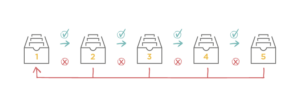
The illusion of knowledge:
why do you think you know
a lesson when you don't?
The illusion of knowledge:
why do you think you know
a lesson when you don't?
Have you ever thought you’d learned a concept from your course and then, once you’re in your exam and you need to remember it, you weren’t able to?
And you never really understood why. If so, you have probably already experienced the illusion of knowledge. This phenomenon, highlighted by Dunning and Kruger in 1999, is a real obstacle to learning. What can you do to avoid it?
WHAT IS THE KNOWLEDGE ILLUSION?
Also known as the Dunning-Kruger effect or the overconfidence effect, this phenomenon is materialised by the impression that we know more about a subject than we actually do.
According to Dunning and Kruger, this cognitive bias is attributed to our inability to assess our true abilities and skills in a field in which we are not experts. So, the less you know about your course, the more likely you are to overestimate your mastery of it.
The main reason? Our inability to differentiate between superficial and deep knowledge.
Superficial knowledge is acquired quickly, through access to information, while deep knowledge requires a lot of time and work.
So how can you assess your real level of knowledge?
IS RECOGNITION REALLY KNOWLEDGE?
The illusion of knowledge most often occurs when you only use passive revision methods.
So-called passive revision methods refer to modes of learning that do not require any action on your part. Examples include reading your notes over and over again, copying them out, and highlighting words or phrases within them. These techniques do not allow for self-assessment and will simply allow you to store information without reusing it. You will therefore only remember in the short term and will forget very quickly, because of the lack of repetition that allows you to memorise well. For example, imagine that you learn a mathematical formula by reading it over several times. You retain it on the spot and can repeat it. But, if you are asked a question 10 days later, and you have not reworked the formula, you may not be able to remember it correctly.
However, when you read it again, you’ll feel that you know it because it will seem familiar to you. You will recognise the answer, but you will not know it. You lack the ability to retrieve the information independently because you don’t have sufficient control over it.
This feeling of having mastered your lessons wrongly can be responsible for unpleasant surprises on the exam day…
But how can you avoid this phenomenon and be ready for your exams?
ANY SOLUTIONS TO AVOID THE ILLUSION OF KNOWLEDGE?
To avoid being affected by the illusion of mastery, don’t forget that a notion that is familiar to you is not always a sign of a mastered notion. Indeed, recognising information is not the same as knowing that information.
Here are some tips on how to really memorise your lessons:
– Use active revision methods:
Avoid passive methods of learning which will only confirm your illusion of knowledge. Instead of highlighting and re-reading your lessons, use active learning methods such as MCQs, gap-fill texts, flashcards, and role-playing. These tools will allow you to know exactly where you stand by allowing you to self-assess precisely where you are lacking and what you have mastered.
The example of flashcards:
Flashcards are small horizontal cards that can be used to divide a course containing a lot of information into cards summarising a notion. All you have to do is write a question on the front and the answer on the back, then read the front and find the answer on the back without cheating. When you think you have found the answer, check if it is correct.
You will know exactly whether you are ready or not before an exam and you will be able to revise more intensively the concepts you do not know until you master them perfectly.
To make sure that you retain your knowledge, you will need to accompany active revision methods with another technique: revising on a regular basis.
– Test your knowledge regularly:
It has been proven that revising repeatedly over time leads to long-term memory. Indeed, by scheduling frequent revision sessions, you will reactivate the concepts each time you take them up. Your forgetting curve will be lengthened, and you will remember the information you need to master for longer.
Moreover, to remember to revise, you can create reminders in SCRIBZEE. On each lesson, card, or flashcard to be reviewed, place an alert at the date and time of your choice. In addition to remembering to revise, you can do so from your smartphone, wherever you are, provided you have scanned your lessons with the SCRIBZEE application.
The example of flashcards:
The Leitner method is a practical application of the principle of spaced repetition. This method, used with flashcards, consists of revising the flashcards that you are less familiar with more frequently, using a flashcard filing system in a box with 5 compartments.
Initially, all flashcards are in box 1. When you answer a flashcard correctly, it is moved to box 2 and so on, until you reach box 5 where your flashcard is mastered. The flashcards in box 1 are the ones you need to review most often to avoid forgetting the information they contain.
A powerful algorithm based on this model has been integrated into SCRIBZEE. It creates personalised revision sessions for you based on your mastery of the flashcards. RESULT: you spend time on the flashcards you know the least.

Remember to revise regularly and frequently over time rather than intensely just before the exam. This will be much more effective.
CONCLUSION:
To avoid the illusion of knowledge, we recommend that you revise regularly by self-assessing as much as possible, in other words, by using active revision methods.
Beware, however, that there are other factors that can explain the impression of memory loss when faced with an exam paper. If, after trying active revision methods at regular intervals, you do not notice any improvement, do not hesitate to explore other factors such as stress. Stress can be paralysing, and it is important to be aware of it to manage it better.




Your email address will not be published.